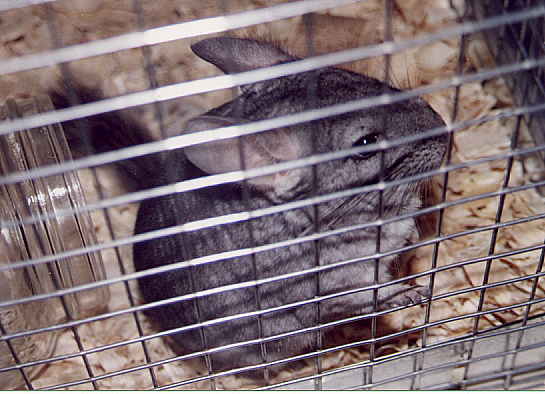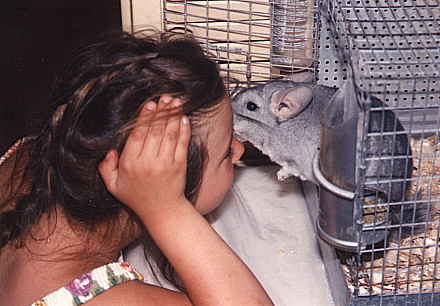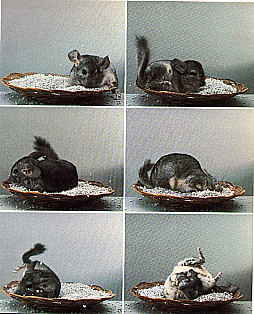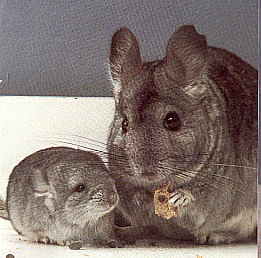
This is my "beast". She is a chinchilla. Her real name is Tiffany but is usually called Tiffy or "beast". She is spoiled rotten and loved by children and adults alike. Even lives in a "condo". I had a special cage built that is 3 levels, lots of space for her to jump around in and boy does she take advantage of it! You can see a pic of her cage in the backgrounds of a few of the other pics on my page. She is a little over a year old now so is fully grown. On this page you will not only see a few pictures but I would also like to give you some information on these wonderful little animals just in case you fall in love and want one of your own..


Their Origins: Chinchillas are originally from the snow covered Andes Mountains in South America. The are jumpers by nature with powerful back legs. I have seen mine jump 4' from a stand-still. Many years ago they were hunted to almost extinction by fur trappers. They have the second most expensive fur in the world. Second only to Sable. It takes over 100 pelts to make one coat. Ugh! At the turn of the century, some of what were left were captured and brought to the States to be bred. Once again, for fur!
Today there are not too many fur farms left (thank goodness) and they seem to have recently become the fashionable pet to have. You can find them in speciality pet stores across Canada. These sweet little animals are distantly related to guinea pigs. Very distantly. Be aware, they have a distinct personality of their own. And each one is individual..

Personality and character: Chinchillas have a lot of personality and are truely fun to watch. I you are considering purchasing one please read this following paragraph. These are not a child's pet. Yes, they are adorable, and the softest thing you will ever feel but they don't like to be mishandled or teased or bothered during the day. Chinchillas are nocturnal by nature and you can't change that. Trying to will kill the animal from stress. These are great pets for teens, young adults and adults that work. They really come alive at dusk and are a joy to watch as they play, jump, chatter and even "bark". They only "bark" when annoyed or afraid though, so expect a little when you first bring one home until it gets used to you and the new surroundings.
If you are still considering one, be sure to go to a reputable pet shop and they absolutely have to have experience with these animals including a lot of knowledge about them. If not, or they seem to be bluffing it, go elsewhere. You need to know how to care for them and don't need any unexpected vet bills. If you live in Toronto, I recommend "The Menagrie", (on Parliament St) a wonderful specialty pet shop that deals only in exotics and are fully up to date on these beauties. Plus they have everything you could possibly want for them. I have dealt with them, and only them for many years.
What to look for: Some of the things you should look for are a nice shiny soft coat. Have the owner of the store take the chinchilla out and let you hold it. If it is very excited and won't sit still of a few seconds, put it back. This is not the one for you. Hyperactive baby chinchillas usually grow into hyperactive adults. They probably will not like to be touched too much or held. No matter how cute the "beast" is... Try another. Now, you have to expect some movement from them. But if they constantly squirm and try to jump out of your hand, put them back. Check their teeth. They have two large front teeth on top and on the bottom. Believe it or not, they should be yellowish, and they should be uniform in size and shape. Sex really makes no difference in temperment so don't worry about it. If you really want to know have the owner check for you. It's a little difficult....Be sure to check their eyes. They should be black, clear and shiny also. Any crusts or anything around the eyes, avoid it. Their ears should have a hint of pink. Look at their little nose, it should be clean and dry. One more thing you should take into consideration before purchasing a chinchilla is a vet. You must be sure there is a vet in your area, or close by, that deals not only with small exotics but with chinchillas. Not all "small exotic" vets do. NOTE: If there are a few chinchillas in one cage at the pet shop and any of them are not perfect little specimens with shiney eyes and such, or show any signs of fatigue or listlessness or any signs of illness or distress do not choose any from there! Something could have been passed already to any or all of the others and you just may not see the signs yet....

Care for your chinchilla: Chinchillas are fairly easy to care for. They pretty much take care of themselves. Obviously a cage is needed. This must be spacious and made from galvanized steel only. No plastic or wood here! These animals gnaw on everything thinking it is food. Even fingers..hehe But...they take what is called a "test nibble", not very comfortable but they shouldn't sink those big teeth into you. You may actually think you have been bitten but when you look, there is nothing there. Some test hard and some test lightly. Once again, it depends on the specific animal. I personally have never been bitten by a chinchilla where it has broken skin and I've handled many in the last 10 years or so. For food, they require a special pellet. Much like a rabbit pellet but with much less fat. Never feed a chinchilla rabbit pellets. You will kill them in the end. For the occasional treat you can give them a sunflower seed or two, a couple of hard kernals of corn, some different seed, or even a raisin or two. Go easy on the raisins, they are not only fattening but have obvious side effects if they get too many in them...Once in a blue moon I will give her a very small piece of lettuce. Greens can be disruptive to their digestive system so if you give any make sure it is a small amount and watch to see if the chinchilla has any problems. If they do it should really should be avoided.
Hay is another necessity. Never, ever, get it from a local farm. The hay chinchillas eat must be from the first cut and grown in a lean top soil. You cannot be guaranteed this from a farm plus unless noticable to your nose, it may have mold in it that you are unaware of. This can kill your animal. Go to your pet store. Purchase either hay or alfalfa. They love both. Another daily requirement is fresh water..I personally use filtered water from a Brita jug. All that chlorine and flouride and other chemicals can't be good for them. You will need some shavings for the bottom of the cage. The shaving should be pine, not cedar like hamster shavings. Pine shavings are easy to get today. These are inexpensive, as are the pellets and the hay. Since chinchillas have constantly growing teeth that need to be naturally filed, they need something in their cage to chew on. Your local pet store should sell little blocks of cut wood. Maybe .25 cents each or so. Do not get wood from a dealer somewhere or an orchard. These could be chemically treated or sprayed with insecticide. You may want to also get your pet a salt wheel and an iron wheel. Both are a treat for them and healthy, and they are hard. Great for gnawing on. Never put plastic toys or painted wood toys in the cage with your pet. And last but not least is "dust". Chinchillas bathe in a very fine dust. They roll around in it and it gets into their fur and absorbes the oils... This is done daily if you wish. Some say it should be only done a few times a week, but they love it so and will get pretty excited when they know it is coming and daily certainly won't hurt them. Chinchilla "dust" is relatively inexpensive also.

Cost: Chinchillas can range in price from about $50 upwards of $100.00 or more. This depends on the age of it, the colour and the independant dealer. Try to get a very young chinchilla that has been bred in a home by a reputable breeder. Make sure the pet shop is very familiar with the breeder they get their babies from. For two reasons. First, a chinchilla bred and raised in a home is already used to some common noises and won't be so frightened and will take less time to accustom itself to your home. Also, being raised in a home from a caring breeder, it has probably already felt human touch and will not be so frightened of it either. Remember, you are bringing a wild animal in your home. Not a dog or cat. As domesticated as they have become over the past 25 years or so, they are not completely domesticated and never will be. Chinchillas wean at approx. 8 weeks so if possible get one as close to that age as possible. And go slow with it...don't expect it to warm up to you right away. Take little steps each day. Also, these sweet things do not travel well. Don't buy it then go out and finish your shopping. Pick him/her out last when you are going directly home.

This is not all the information on Chinchillas by far. I just wanted to give you some information and some of my past experience with these animals in case you are thinking about purchasing a chinchilla for yourself...They really are a wonderful pet, low maintenance and a delight to everyone who see's them. There are many good books out there about chinchillas, your pet store probably has at least one and your local library should carry a few also. Two books I do recommend though are "Chinchillas, A Complete Pet Owners Manual. This is published by "Barrows" books. Written by Maike Roder-Thiede. The ISBN # is 0-8120-1471-5. The other book I recommend is "Chinchillas, A Complete Introduction". This book is written by Jack. C. Harris. It is publish by T.F.H. publications. ISBN # is 0-86622-393-2.

 Sign My Guestbook
Sign My Guestbook